Apple Car: The ultimate guide to Project Titan and the driverless iCar
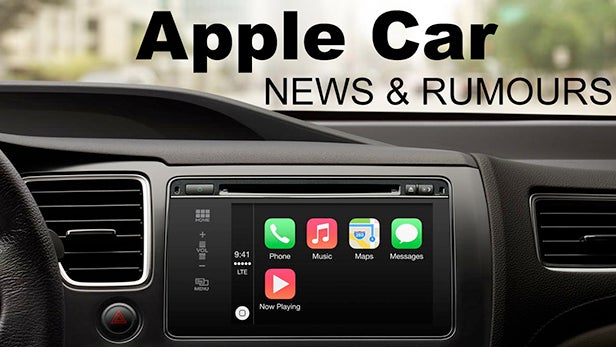
Ready for the Apple Car – or maybe iCar, or even Project Titan? If you still have hope then here’s what we know so far, including the expected Apple Car price, release date, news, leaks, design, and whether it’s driverless and/or electric.
(Update: June 28, 2017): Apple has reportedly teamed up with rental car agency Hertz to test autonomous vehicle software. Read on to find out more.
The Apple Car is a tricky subject because we’re not even sure that it exists. Nevertheless, few products have been rumoured as heavily – and debated so vociferously – as the Apple Car. Tesla CEO Elon Musk is already calling the car a “missed opportunity” due to its far-off launch. There’s no denying that the evidence of an Apple Car is mounting, and it seems Apple is struggling to keep a lid on leaks.
The long-rumoured electric vehicle – supposedly developer under the codename ‘Project Titan’ – is tipped for either a 2019 or 2020 launch. It’s also alleged that Apple is developing the vehicle in Berlin (in part, anyway), with a team of between 15 and 20 “progressive thinkers” – so says the German media. The Cupertino-based technology giant is also reportedly in talks with manufacturers of charging stations for electric cars.
In any case,
The actual design of the vehicle is still up for debate. Some say it will be a car, others a minivan. Some say it will be driverless, others electric – maybe both. Apple was recently reported to be interested in autonomous vehicle testing facilities, which suggests that the former may certainly be true.
What we do know is that Apple certainly has the resources to build an electric car. Even a senior Ford exec admitted to TrustedReviews that he thinks Apple “can do it”. After all, the company has a world-leading market capitalisation of $524 billion, and has over $200 billion cash in the bank. Tesla started with far less.
But is there any evidence to suggest that Apple is building an Apple Car? And if such a vehicle exists, what will it look like?
Ford on Apple’s and Google’s self-driving cars:
In Brief
When is the Apple Car coming out? 2020 (rumoured)
What can we expect? Electric minivan, possibly driverless
How much will the Apple Car cost? $55,000 estimate
Related: Apple Car: The biggest challenges Apple faces
Apple Car leaks and proof – Is there any Apple Car evidence?
Vague concepts of an “iCar” have been spun for an age, but we’re all about hard evidence here at TrustedReviews. To that end, we’ve rounded up all the apparent “proof” for the existence of an Apple Car.
This section is in chronological order.
Apple Car News: 2015
Silicon Valley speculation
On 12 February 2015, Bryan Chaffin, co-founder of The Mac Observer, told Business Insider that he is “certain” Apple is working on an electric vehicle. Chaffin said:
“What I learned is that Apple has been looking for – and acquiring – the kind of people from Tesla with expertise that is most suited to cars. So much so that I went from being a doubter to a believer almost instantly. From another source who travels in more rarified circles than yours truly, I also learned that a lot of people at the top in Silicon Valley consider it a given that Apple is working on a car.”
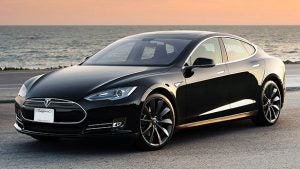 The Tesla Model S
The Tesla Model S
He then added that he was close “to 100%” certain that Apple was attempting to build a car for the consumer market.
Tim Cook’s mini-van
On 13 February 2015, the Wall Street Journal noted the existence of a project “Titan”, green-lit by Apple CEO Tim Cook. The project was reported to entail an electric vehicle “that resembles a minivan”.
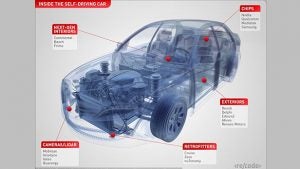 Concept render (via re/code)
Concept render (via re/code)
At the time, it was claimed that Apple was still in the vehicle design stage. The piece read:
“The size of the project team and the senior people involved indicate that the company is serious. Apple executives have flown to Austria to meet with contract manufacturers for high-end cars, including the Magna Steyr unit of Canadian auto supplier Magna International Inc.”
The WSJ went on to say that Apple “hopes to put its stamp on the electric vehicle market in the same way it did the smartphone with its iPhone”, and that the firm had given the go ahead for the creation of a 1,000-person team, and permitted poaching from different parts of the company.
Five years and counting
On 20 February 2015, a Bloomberg report alleged that Apple was definitely planning to enter the car market. The article claimed that the company was working to a five-year time frame, which would put the release in the year 2020.
Manufacturing at the Sunnyvale Campus
On 13 March 2015, AppleInsider published an extensive report detailing the location Apple may be using to develop the Apple Car.
The article cited “two people familiar with knowledge of the project”, suggesting that Apple is making use of its leased Sunnyvale, California campus to build the car.
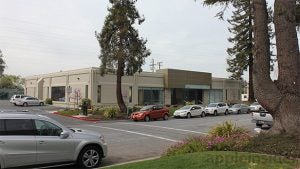 The Sunnyvale campus (via AppleInsider)
The Sunnyvale campus (via AppleInsider)
The website writes:
“According to one AppleInsider source familiar with ‘Titan’, many of Apple’s new auto-related hires, including recruits from Tesla, have been working out of the Sunnyvale campus. This person claims that some of the projects underway have been kept ‘very secret within the company’.”
Secret shell company
But Apple couldn’t openly develop a car right in front of everyone’s eyes, could it? Well that same AppleInsider report makes mention of a company “SixtyEight Research”, which it suggested may be a shell company being used by Apple to work on the car.
According to the company website, SixtyEight Research is a self-proclaimed “innovative company” that’s “redefining market research”. It’s based at the Sunnyvale campus. What’s particularly interesting about SixtyEight Research is that it has almost no presence online, and no-one really knows what the company actually does. The report explains:
“SixtyEight’s affiliation could not be confirmed, but Apple does have a long history of using shell corporations and deceptive methods to hide its secret projects. Aside from a barren website, there is scant other information about SixtyEight – lending more credence to its use as a front. It wouldn’t be a stretch to surmise that SixtyEight could play a role in allowing Apple to purchase and import automotive equipment and tools without drawing any suspicion.”
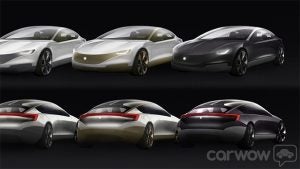 Concept renders (via CarWow)
Concept renders (via CarWow)
The article also details how employees approach the site with Apple badges that have been “scrubbed” of the official Apple branding. What’s more, certain buildings on the site have been given permits for automotive work and repair areas. Unfortunately, we still don’t know exactly what Apple is cooking up at the Sunnyvale Campus, and the company has declined to provide official comment on the matter.
Related: Apple CarPlay vs Android Auto
“Ultimate mobile device”
On 27 May 2015, Jeff Williams, SVP of Operations at Apple, dropped a huge hint that the company may be eyeing the automotive industry.
When quizzed about Apple’s oft-rumoured interest in building an electric car, Williams responded: “The car is the ultimate mobile device.” He also said that Apple is “exploring a lot of different markets”, and that the company hopes to enter industries “where we think we can make a huge amount of difference”.
Meetings with BMW
On 1 August 2015, a Reuters article noted that several senior Apple employees had made a number of visits to BMW facilities over the past year.
The report cited “two sources familiar” with the matter, and revealed that Apple CEO Tim Cook visited BMW’s headquarters in 2015. It also claimed that “senior Apple executives” toured BMW’s Leipzig factory to “learn how it manufactures the i3 electric car”.
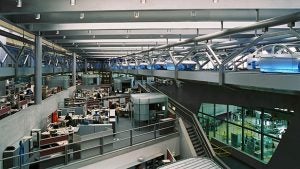 BMW’s Leipzig plant
BMW’s Leipzig plant
“The dialogue ended without conclusion, because Apple appears to want to explore developing a passenger car on its own,” the report explains, and suggests that BMW was “cautious” about sharing “manufacturing know-how” with Apple because it doesn’t want to end up as a “mere supplier”.
Apple executives reportedly probed BMW board members on tooling, production and parts licensing. A senior BMW source was quoted as saying: “Apple executives were impressed with the fact that we abandoned traditional approaches to car-making and started afresh. It chimed with the way they do things too.”
Searching for a test facility
On 14 August 2015, The Guardian detailed an apparent attempt by Apple to secure a testing facility for the Apple Car. The publication obtained documents that proved correspondence between Apple and a potential test site. The report claimed that Apple had scouted a 2,100-acre former Naval base – 40 miles from Silicon Valley – which is now a facility for testing driverless cars.
According to the report, Apple’s Special Projects team visited the GoMentum Station in May, with talks still ongoing. In one correspondence, Apple engineer Frank Fearon is alleged to have written:
“We would…like to get an understanding of timing and availability for the space, and how we would need to coordinate around other parties who will be using [it].”
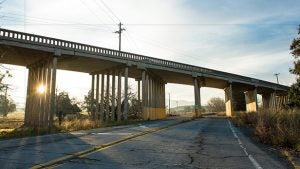 The GoMentum Station
The GoMentum Station
Jack Hall, GoMentum Station program manager, reportedly responded:
“We would still like to meet in order to keep everything moving and to meet your testing schedule.”
The station – which has been used by both Mercedes-Benz and Honda for autonomous vehicle testing – is currently bound to a non-disclosure agreement with Apple regarding discussions.
Meetings with California’s motor department
On 18 September 2015, The Guardian released another report that suggested Apple executives have “discussed their plans” for a self-driving car with California’s Department of Motor Vehicles.
The article – based on documents related to the matter – revealed that Mike Maletic, a senior legal counsel at Apple – had an “hour-long meeting” with Bernard Soriano, DMV deputy director, and Stephanie Dougherty, chief of strategic planning, on 17 August. These individuals are the DMV’s self-driving car experts, and co-sponsors of California’s autonomous vehicle regulation project. Also alleged to have attended the meeting is Brian Soublet, deputy director and chief counsel of the DMV.
According to the report, the DMV didn’t disclose the details of what was discussed at the meeting, only stating: “The Apple meeting was to review [the] DMV’s autonomous vehicle regulations.”
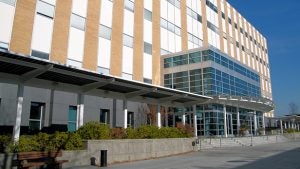 California’s Department of Motor Vehicles
California’s Department of Motor Vehicles
We already know that California’s DMV is currently working on regulations to control the eventual public rollout of self-driving vehicles. If Apple is plotting an electric vehicle, it will need to adhere to these regulations to operate on Californian roads.
“Accelerating efforts”
On 21 September 21 2015, the Wall Street Journal claimed that Apple was scaling up its “Project Titan” operations. According to the report, Apple is tripling its 600-strong workforce at its secret automotive facility.
It’s alleged that the company has a planned shipment date of 2019, and that Apple is “accelerating efforts” to meet its deadline.
“Massive change”
On 19 October 2015, Apple CEO Tim Cook spoke out about the automotive industry. Speaking at the WSJDLive conference in California, Cook said:
“It would seem like there will be massive change in that industry, massive change. You may not agree with that. That’s what I think.”
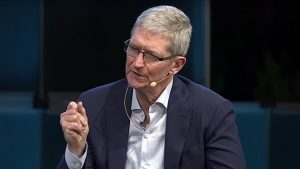 Tim Cook at WSJDLive
Tim Cook at WSJDLive
Unfortunately, Cook stopped short of saying whether Apple would be directly involved with this change. And of course, much of the speculation about the Apple Car is based on employees hired by Apple, which we’ll detail in the next section.
Faraday Future
On 6 November 2015, the New York Post published a profile of a mysterious electric car company called Faraday Future.
The Californian firm, which began its operations in 2015, is currently building a “billion-dollar manufacturing plant” and “poaching the best minds in the auto world”, according to the report. The Post notes that the company acquired its funding in a peculiarly short space of time. What’s more, the company currently has upwards of 400 employees, and aims to increase that to 500 by the end of the year. That’s impressive scaling for a year-old company with no existing products to its name.
Faraday Future is also keeping the identity of its CEO quiet. Instead, Nick Sampson, former director of vehicle and chassis engineering at Tesla, who now works as Senior VP for the firm, handles public correspondence.
“
The Post suggests that Faraday Future may actually be a front for Apple, to develop its secret car project in plain sight. Sampson previously told reporters that the company was aiming to launch a brand-new electric car that would rival the Tesla Model S. However, the company is aiming to launch the vehicle in 2017, two years earlier than Apple was rumoured to release its own car.
Unfortunately, there’s no concrete evidence that links Faraday Future to Apple, so take this report with caution.
Related: 4 things we didn’t hear about during Apple’s September event
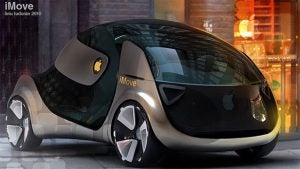 The iMove, a concept render (via Liviu Tudoran)
The iMove, a concept render (via Liviu Tudoran)
Cork, Ireland?
On 16 December 2015, a report by Silicon Republic speculated on a possible ploy by Apple to build the Apple Car in Ireland. The report noted a recruitment drive by Apple, specifically targeting auto industry experts to work at its plant in Cork.
One recent job post included a “Global Supplier Manager” position with experience in the automotive industry. Another advertised for a “Procurement Manager” with experience in “automotive design”. The job description explained that Apple was seeking applicants who could “achieve most efficient costs for equipment while helping enable Apple’s unique design and testing requirements”.
Tim Cook also recently took a trip to Ireland to meet with Apple employees, pledging 1,000 new jobs for the Cork plant, which is currently staffed by a 5,000-strong workforce. Of course, we can’t say for sure what Apple is planning for the Cork plant until more evidence comes to light.
(apester:569795558089e8dd05d295f8)
Apple Car News: 2016
Apple.car
On January 8, 2016, it became apparent – courtesy of a MacRumors report – that Apple had registered three car-related domains, hinting at the as yet unconfirmed Apple Car project.
The domains in question were:
- apple.car
- apple.cars
- apple.auto
Of course, there’s no guarantee that these domain registrations mean Apple is working on an automotive project. Companies often buy out – and sit on – domains simply to prevent rival entities scooping them up ahead of time.
It’s also worth noting that the domains could be related to the Apple CarPlay connectivity system, which is a publicly available product.
An open secret
On January 12, 2016, Elon Musk, the man behind Tesla, SpaceX, and Paypal, described the Apple Car as “obvious”, and “an open secret”.
Musk made the comments in an interview with the BBC, during which he revealed he believes Apple would “probably make a compelling electic car”, and that “it seems like an obvious thing to do”. The Tesla boss also said that “it’s pretty hard to hide something if you hire a thousand engineers to do it”.
Exploring
On February 22, 2016, Tim Cook spoke to Fortune about the company’s explorations in the automotive sector.
“
He continued: “Part of exploring technologies and picking the right one is becoming so familiar with it you can see ways that it can be used. And for us, we’ve never been about being first. So we explore many different things, many different technologies. And at first we might not know what product it might wind up in.”
Christmas Eve
On February 26, 2016, Cook talked about prospects of an Apple Car yet again, this time at Apple’s annual shareholder meeting, courtesy of re/code.
“Do you remember when you were a kid and Christmas Eve was so exciting? You weren’t sure what was going on downstairs? Well, it’s going to be Christmas Eve for a while.”
Not so helpful, Tim.
Apple ist ein Berliner?
On April 19, 2016, a period of quiet in Apple Car rumour-dom came to an end with a report from a German newspaper claiming the vehicle was in development in Berlin. According to Frankfurter Allgemeine Zeitung, Apple has employed between 15 and 20 automotive experts at a “secret lab” in the German capital.
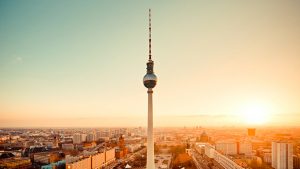 Is Apple developing the Apple Car in Berlin?
Is Apple developing the Apple Car in Berlin?
The report cites the workers as having experience in engineering, manufacturing, software, and sales, and describes them as “progressive thinkers”. The same article alleged that Apple is considering using Austrian-based Magna Steyr – an automotive manufacturer – to build the Apple Car.
Magna Steyr is a subsidiary of Magna International, and is headquartered in Graz, Austria. It was founded in 2001, and has around 10,500 employees. The company builds around 200,000 vehicles a year, and developed Mercedes-Benz’s ‘4Matic’ four-wheel drive system. It also develops cars on behalf of manufacturers like BMW, Audi, Fiat, Peugeot, and Aston Martin.
The search for land continues
On May 6, 2016, the Wall Street Journal claimed Apple was eyeing up a huge property in California to test out its secretive driverless Apple Car project.
The report cited a “top landlord” in the area – Victor Coleman, CEO of Hudson Pacific Properties – who reportedly said:
“We’re seeing the Toyotas of the world, the Teslas of the world, BMWs, Mercedes. Ford now is out in the marketplace looking for space. I haven’t even mentioned the 400,000 square feet that Google’s looking to take down and the 800,000 square feet that Apple’s looking to take down for their autonomous cars as well.”
Hudson Pacific is a major landlord in the San Francisco Bay Area, and already rents properties to tech giants like Uber and Square. According to the WSJ, Coleman described driverless vehicle testing facilities as a “hot demand item”, and said that there is a “definitive movement” from Silicon Valley companies in the space.
A digital car key?
On May 24, 2016, it was revealed that the US Patent and Trademark office had awarded a patent that allowed a vehicle to be controlled using a portable device, like an iPhone or iPad. The patent describes how the device could unlock the car doors or even start the engine, and also allows for multiple devices to control the car at any one time. Here are some of the operations Apple reveals the iPhone could perform:
- Unlocking the doors
- Starting the engine
- Activating the audio or audiovisual entertainment system
- Activating GPS
- Activating the dashboard console
- Turn on passenger lighting
- Adjust seats
- Turn on headlights
- Open the sun roof
- Turn on windshield wipers
- Activate automatic parking
- Activate wireless communications
This is, of course, not necessarily evidence of an Apple Car. However, it does signal Apple’s continued efforts in the vehicle space, and shows that Apple has plenty to offer in terms of innovation. Getting third-party car manufacturers to sign up to this wide-reaching ecosystem will surely be on Apple’s agenda, although an Apple Car would likely debut with all of this technology built in anyway.
Making a charge for EVs
On May 25, 2016, an exclusive Reuters report claimed that Apple has been speaking to manufacturers of charging stations for electric cars. The report claims
The sources cited in the report were unclear about whether Apple hoped to build its own charging stations, or simply engineer compatibility with existing systems. Apple declined to comment on the story, but the president of NRG Energy’s EVgo charging business said he was “in discussions with every manufacturer of today and every potential manufacturer of tomorrow”. That’s not exactly a denial, is it?
Speaking to Reuters, an anonymous source said: “It would be natural to assume if Apple is going to have a fully battery electric vehicle that creates a seamless consumer experience the way Apple does, the charging infrastructure and its availability would be of paramount importance.”
Canadian suppliers
On June 16, 2016, Bloomberg reported on possible evidence of Apple’s interest in the automotive sector. According to the article, Canadian auto-parts maker Linamar Corp. has talked with both Apple and Google about potentially supplying vehicle components. During an interview in Toronto, CEO Linda Hasenfratz decline to go into detail on the matter, but said:
“
Apple didn’t immediately respond to Bloomberg’s request for comment, so we should take this report with due caution for now.
Formula 1 acquisition?
On July 13, 2016, Formula 1 blogger Joe Saward suggested that Apple may be involved in purchasing the Formula 1.
Apple hasn’t really got a history of high-profile acquisitions, usually opting to snap up smaller companies and integrate them into the firm’s existing structure. An F1 buy would be a different proposition altogether, but it’s actually not that crazy. For one, it’s no secret that Formula 1 is up for sale – the group has been publicly looking for a buyer since 2015, with supremo Bernie Ecclestone saying he’s ‘ready’ to sell the financially struggling series.
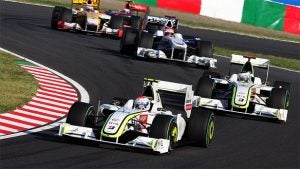 Formula 1: Apple’s next buyout?
Formula 1: Apple’s next buyout?
There’s even been a price attached to the wildly popular racing championship: $8.5 billion (around £6 billion). It was previously thought that the buyer would be a US-Qatari consortium led by Qatar Sports Investments, best known as the ultra-rich owners of French Ligue 1 football outfit Paris Saint-German. However, Saward says that Apple could also be throwing in its lot at the last minute:
“There are whispers from Princes Gate, home of the Formula One group, that there is another round of intensive due diligence going on, which suggests that there is another serious bidder emerging.
A Formula 1 buyout isn’t evidence of an Apple Car, but it offers some decent crossover. As well as acquiring a high-profile platform to promote the Apple Car, it would also take on the organisation’s strong relationships with premium car makers like Ferrari, Williams, and McClaren. Even more interestingly, as the owner of F1, Apple would be catapulted into a seat at the table with governing body FIA, which also oversees the burgeoning Formula E electric car racing series.
Plus, Formula 1 is one of the most-watched sports in the world, so exclusive streaming rights would be a huge boon for Apple TV.
Delayed launch
On July 21, 2016, a new report by The Information claimed that the Apple Car won’t be available until 2021. The article describes how Apple has pushed back its internal target of 2020 by a whole year. The report reads:
“One person who worked briefly with the Titan team was told during their tenure at Apple that the company had been trying to deliver a vehicle by 2020 but the target slipped to 2021.”
New boss with a familiar face
On July 25, 2016, a new WSJ report claimed that Apple had appointed a former top exec to head up its Apple Car project. Bob Mansfield, a former Senior Vice President at Apple, is now in charge of Project Titan, according to “people familiar with the matter”. The report noted:
“Earlier this month, employees at Apple noticed in the company directory that all the senior managers on the car project were now reporting to Mr Mansfield.”
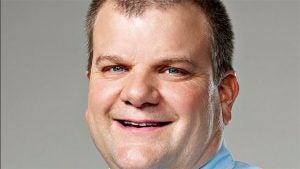 Apple’s Bob Mansfield now reportedly heads up Project Titan
Apple’s Bob Mansfield now reportedly heads up Project Titan
Bob Mansfield is a hardware engineer who was previously Senior Vice President of Technologies. He joined Apple in 1999 and worked as a top executive under the late CEO Steve Jobs. Mansfield left the executive team in 2013 to work on “special projects under CEO Tim Cook”.
Mansfield’s recent career has been shrouded in mystery, with the former executive having reportedly supervised the development of the Apple Watch and smart television products. He also led the teams that developed the MacBook Air, the iMac, and the iPad.
Focus on driverless tech
On July 28, 2016, a Bloomberg report claimed that Apple is placing “increased emphasis” on developing self-driving technology, citing people familiar with the project.
The report says that Apple has hired Dan Dodge, the former head of BlackBerry’s automotive software division, to help lead this new push. Dodge is reportedly part of a team headed up by Bob Mansfield, who recently took over leadership of the Project Titan initiative. Bloomberg also makes clear that Apple is “not abandoning efforts to design its own vehicle”, and that the company wants to leave options open regarding building its own Apple Car or partnering/acquiring an established car maker.
Hollow batteries
On August 9, 2016, Korean news site ETnews reported that Apple had tapped a Korean battery company to help develop batteries for the Apple Car. These batteries would, apparently, feature patented hollow battery technology, although the report declined to name the company in question.
A follow-up article by MacRumors alleged that the company in question may be Orange Power, a Korean company that has filed a patent application for hollow-type secondary batteries, and has 33 employees.
However, none of the information contained in either report has been confirmed.
Death to the Apple Car?
On September 9, 2016, the New York Times reported that Apple had sacked “dozens” of employees working on the Apple Car.
According to the report, Apple is rethinking its plans for self-driving cars, shuttering parts of the project and even laying off employees. That’s according to three different sources that were brief on the decision, but who were not able to comment on the matter publicly.
The report suggests that Apple veteran Bob Mansfield, who took the helm on ‘Project Titan’ back in July, has shifted the focus of the project, moving from developing a car to “building out the underlying technology for an autonomous vehicle”. The new layoffs are said to be a part of this Project Titan “reboot” – the total workforce is estimated at around 1,000 employees, for reference.
McLaren takeover denied
On September 21, 2016, the Financial Times reported that Apple had launched a bid to buy out McLaren Technology Group, the British supercar giant and owner of the eponymous Formula One team.
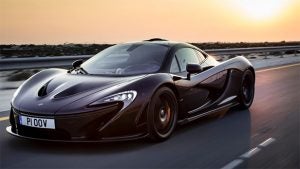
Apple reportedly approached McLaren with a view towards a “full takeover”of, or the strategic investment in, the car company, citing three people “brief on the negotiations”. The talks are said to have been ongoing for several months, and that the takeover may be in a bid to “accelerate Apple’s secretive automotive project”. Sources suggest that McLaren is valued at between £1 billion and £1.5 billion.
However, McLaren was quick to shut down rumours, releasing a statement that said: “We can confirm that McLaren is not in discussion with Apple in respect of any potential investment.”
Is it all over?
On October 17, 2016, Bloomberg published a report suggesting that the Apple Car may never see the light of day, describing how Apple has ‘drastically scaled back its automotive ambitions’.
Apple has decided to pull back on the development its long-rumoured electric vehicle, according to the report. Apparently, the iPhone maker has now decided to refocus its efforts on developing an autonomous driving system, rather than taking on Tesla with an actual vehicle of its own.
This re-shifting of priorities has reportedly led to hundreds of job cuts affecting the secretive Project Titan team. According to the report, Apple is keeping staff numbers ‘steady’ by hiring new people to work on the driverless car system, following a lengthy spate of reassignments, redundancies, and voluntary departures.
It’s believed that Apple started designing its own driverless electric vehicle back in 2014, with the company embarking on an “aggressive hiring spree” to meet its purported 2020 launch Goal. But Bloomberg remarks that Apple began to struggle early on:
“
Zadesky was quickly replaced with Apple veteran Bob Mansfield, who quietly assumed charge of the Apple Car development. But as Bloomberg explains, Mansfield quickly shuttered hopes of a vehicle:
“About a month later, Mansfield took the stage in a Silicon Valley auditorium packed with hundreds of Titan employees to announce the strategy shift, according to people who attended the meeting. Mansfield explained that he had examined the project and determined that Apple should move from building an outright competitor to Tesla Motors Inc. to an underlying self-driving platform.”
According to the report, Apple has particularly struggled with automotive supply chains, which is no surprise.
Maybe this isn’t the end after all
On December 4, 2016, Apple revealed its interest in driverless cars in a letter written to America’s National Highway Traffic Safety Administration.
The iPhone maker says it is “excited about the potential of automated…transportation” in a five-page open letter penned by Steve Kenner, Director of Product Integrity at Apple. The letter describes Apple’s ongoing interest in self-driving vehicles, explaining:
“Apple looks forward to collaborating with NHTSA and other stakeholders so that the significant societal benefits of automated vehicles can be realised safely, responsibly, and expeditiously.”
The letter continues:
“
Apple makes a number of requests in the letter, most notably that new entrants to the industry – like Apple – should be treated equally to long-time car makers, to “maximise the safety benefits…encourage innovation, and promote fair competition”.
Kenner refers specifically to a recent provision that Congress enacted with the FAST Act (Fixing America’s Surface Transportation), that allows established car makers to test on public roads without having to seek legal exemptions – but it doesn’t apply to new entrants.
“Instead of applying for exemptions, all companies should be given an opportunity to implement internal safety processes summarised in a Safety Assessment,” writes Kenner, adding: “This is the most efficient and effective way to ensure that development vehicles and designed and operated with a level of safety equivalent to best practices and FMVSS and will not be used by the general public.”
Maybe the dream of an Apple Car isn’t over at all?
Apple Car News: 2017
Automotive experts hired?
On March 29, 2017, a report out of Switzerland suggested that “at least” 10 doctoral and postdoctoral students from EHT Zurich had left the university to work at a local Apple facility. According to Inside-IT, the former students would be working on the self-driving car project.
‘Almost certainly’ exploring building a car
On April 18, 2017, a report by CNBC detailed how top Apple analyst and venture capitalist Gene Munster believes the company is “almost certainly” exploring how to build an entire car.
Munster was quoted as saying: “In an ideal world,
“In reality, the complexity of designing and manufacturing a vehicle may push the company to integrate deeply with an automotive partner or partners in an effort more similar to the Apple TV – plugging Apple’s technology into an existing product,” he continued.
Munster added that the “auto market poses challenges that Apple may not be able to overcome on the hardware side”, and noted: “Aside from finding a partner, we note that the typical automotive design process takes 5-7 years. Even on an accelerated timetable, Apple is likely multiple years away from a completed hardware design for a car.”
Training documents reveal ongoing plans
On April 22, 2017, we reported on a Business Insider article that revealed Apple had received a permit to test autonomous vehicles on California’s roads. The documents revealed how Apple would be using six drivers to test out three Lexus RX 450h SUVs.
Apple Car spotted in the wild?
On April 28, 2017, less than two weeks after Apple was given the all-clear to trial driverless cars on Californian roads, images emerged of a Lexus RX450h decked out in autonomous car tech leaving an Apple facility.
The photos, which were supplied to (and published by) Bloomberg, revealed a car that was kitted with a number of sensors, including 64-channel lidar, two radars, and several cameras. Importantly, these sensors appeared to have been bought from third-party manufacturers, rather than having been custom-built by Apple itself.
Check out the images, courtesy of Bloomberg:
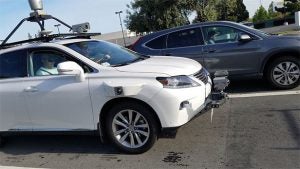
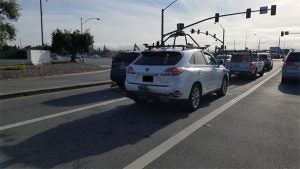
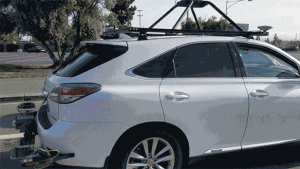
Tim Cook confirms driverless car efforts
On June 13, 2017, during an interview with Bloomberg, Apple CEO Tim Cook confirmed that the company was working on driverless car software.
It may not have have been the big Apple Car reveal we’d been hoping for, but it acts as definitive proof of Apple’s interest in the autonomous vehicle sector. According to Cook, the software is a “core technology that Apple sees as “very important”.
“
Cook didn’t confirm that an Apple Car was in the works however, but he continued: “Autonomy is something that’s incredibly exciting for us, but we’ll see where it will taking us. We’re not really saying from a product point of view what we’ll do, but we’re being straightforward that it’s a core technology we view as very important.”
Hertz partnership
On June 26, 2017, Bloomberg published a report claiming that Apple had leased a small fleet of cars from Hertz, the USA’s second largest vehicle rental agency.
The article alleged that Apple was leasing Lexus RX450h SUVs from the Donlen fleet-management unit, and cites the source as documents recently released by the Californian Department of Motor Vehicles. These vehicles are supposedly being used to test autonomous driving software.
Apple Car hires – Who’s working on the Apple Car?
The company has been on quite the hiring spree, specifically recruiting individuals with experience in vehicles (particularly electric), autonomisation and AI, and materials research. In fact, Apple’s poaching has been so prolific that a number of companies – notably A123 and Mission Motors – have spoken out against the tech giant.
Not surprisingly, Tesla has been a particular focus of Apple’s aggressive hiring regime.
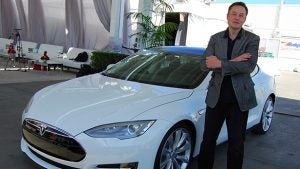 Elon Musk, Tesla CEO, with a Tesla Model S
Elon Musk, Tesla CEO, with a Tesla Model S
When asked if Tesla was concerned about Apple’s poaching of its important engineers, company founder Elon Musk responded:
“Important engineers? They have hired people we’ve fired. We always jokingly call Apple the ‘Tesla Graveyard’. If you don’t make it at Tesla, you go work at Apple. I’m not kidding.”
However, Musk later backtracked on his comments, tweeting the following:
https://twitter.com/statuses/652605371857530880
But do we have any idea who specifically might be working on the Apple Car? Wikipedia has compiled a list of individuals that may be involved with the project:
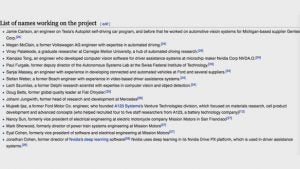
It’s clear from the list that Apple has pumped considerable resources into attracting people whose experience could be useful in the development of an electric vehicle. Of course, this still isn’t definitive proof; Apple could be utilising these individuals’ skills for any number of tangential purposes.
On January 22, 2016, it emerged that Steve Zadesky – who headed up Project Titan since its 2014 inception – was leaving Apple for ‘personal reasons’, as first reported by the Wall Street Journal. Zadesky had worked at Apple for 16 years, and led the Apple Car project for two years; prior to that, he worked as an engineer at Ford Motor Co.
And on July 25, 2015, the Wall Street Journal reported that former Apple SVP Bob Mansfield had been moved to a new position from which he now oversees the development of Project Titan. Employees at the company reportedly noticed that “all senior managers” now report to Mansfield.
Related: 9 creepy ways robots are replacing humans
Apple Car release date – When will the Apple Car launch?
In spite of how vague the rumours about the Apple Car have been thus far, most sources seem to agree on a launch time frame. While we don’t have an exact date, the general consensus is that the Apple Car release is set for 2019 or 2020.
Apple investor tycoon Carl Icahn says Apple is eyeing 2020, which is echoed by a Bloomberg report. The Wall Street Journal, meanwhile, reported in 2015 that the Apple Car would land in five year’s time – that’s 2019. That might seem far off, and so it should; developing a vehicle is no mean feat. That’s especially true for Apple, a company that is – aside from CarPlay – entirely green to the automotive industry.
But is it already too late for Apple to enter the car business? According to Tesla’s Elon Musk, the Apple Car is a “missed opportunity”. Speaking during an interview at the Code Conference in California, Musk said:
“I think they should have embarked on this project sooner. I don’t think they’ll be in production sooner until 2020. It’s just a missed opportunity. It’s a couple years…they’ll make a good car and be successful.”
However, he added: “I think it’s great they’re doing this, and I hope it works out.”
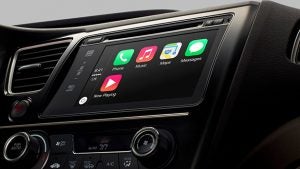 Apple CarPlay
Apple CarPlay
Can Apple really build a car?
Apple has money by the truck-load, but that’s no guarantee that the Apple Car will be a successful venture, right?
In fact, a number of industry executives have already spoken out against Apple’s rumoured efforts, including former GM and BMW exec Bob Lutz:
“If I were a shareholder I’d be very upset, because they’re currently engaged in a very high-margin business and the automobile business, at best, is a very low-margin business. And you can’t show me one company in the world that, to date, has made a nickel on electric cars. There is absolutely no reason to assume that Apple is going to be financially successful in the electric car business.”
The damning verdict continued:
“When it comes to actually making cars, there is no reason to assume that Apple, with no experience, will suddenly do a better job than General Motors, Ford, Volkswagen, Toyota, or Hyundai. So I think this is going to be a gigantic money pit, but then it doesn’t matter. I mean Apple has an embarrassment of riches, they don’t know where to put the cash anymore. So if they burn 30 or 40 billion dollars in the car business, no one’s going to notice.”
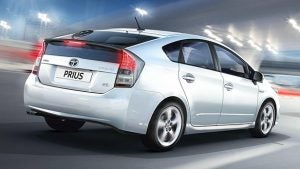 The Toyota Prius, a full hybrid electric mid-size hatchback
The Toyota Prius, a full hybrid electric mid-size hatchback
He added: “If I were a board member of Apple, I’d ask some serious questions about this thing.”
Lutz isn’t the only one to cast doubts about the technology industry’s ability to develop a quality autonomous EV by 2020. Speaking to TrustedReviews, a Ford engineer revealed that self-driving cars are “at least 15 years or so away”, specifically citing Google’s plan for self-driving cars by 2020.
“I think 2020 is unrealistic, at least not on very road. Maybe in their environment in their city, but not on every road,” Andreas Meyer, a Ford development engineers, told us.
We also spoke to Nvidia, who cast doubts on Apple’s ability to turn out a car very quickly. In an interview with TrustedReviews at CES 2016 in Las Vegas, Dave Anderson, Senior Manager of Automotive Integration at Nvidia, described how building vehicles is a challenging process, even for Apple.
“
However, Anderson described how technology companies like Apple – which have a longstanding history in computing systems – have a good shot at overtaking traditional vendors.
“There is somewhat of an advantage initially, and you could see [Ford] supplanted by very motivated companies, like Tesla,” he continued. “Literally with that dedication and that motivation, [Elon Musk] created a car company within about ten years. But again, it’s ten years.”
Nvidia currently builds computing systems for cars, and is developing technology for a self-driving future.
The firm, best known for its graphics cards, has a number of partners in the car space, including Audi, BMW, and Daimler. But despite these doubts, all things point to Apple trundling along towards its 2020 launch window.
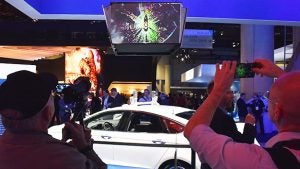 Ford autonomous driving technology at CES 2016
Ford autonomous driving technology at CES 2016
A surprising proponent of the long-rumoured Apple Car is Ford, as revealed during an exclusive interview with Don Butler, Executive Director for Connected Vehicles and Services at the company, speaking to TrustedReviews at CES 2016. Butler said he believes both Apple and Google can create successful car franchises, and is excited to see competitors join the industry.
“We welcome othes joining. We welcome the activity that’s in the space. We think it’s exciting. It’s actually changed that we are embracing,” Butler told us. “So I think Apple can do it. I think Google can do it.”
Ford’s connected vehicles lead continued: “I think that what you will most likely see is a number of partnerships with companies that bring different skill-sets to the table working together to deliver solutions that neither of them could have done possibly on their own.”
Butler also told us he thinks fully self-driving cars will be on the road by 2020, which gels with Apple’s much-mooted 2019/2020 timeline.
And in April, the CEO of Ford revealed that the car-maker has a “working assumption” that Apple is building an Apple Car, during an interview with the BBC. Mark Fields said that he really has “no idea” whether Apple is creating a car:
“
“There’s a lot of traditional competitors that we have in our business who we know and respect,” the Ford CEO explained. “There’s a lot of new non-traditional competitors, who are looking at the automotive space and looking at that addressable market and saying ‘Gee, can we get a piece of that?'”
He added: “From our standpoint, we’re looking at a number of the technological changes in the industry, and we’re viewing that as an opportunity, not as a threat.”
Check out our interview with Ford on the future of autonomous vehicles:
Apple Car design – What will the Apple Car look like?
Right, so there’s plenty of evidence that Apple might be building a car, but what would such a vehicle look like?
Well we already know that Apple has a penchant for slick minimalism, an aesthetic that’s maintained across all of its products. Unfortunately, all things point to Apple still being in the design phase for the Apple Car, so it’s unlikely that the finer details will have been finalised yet.
Our best clue yet is the WSJ mentioned earlier – dated 13 February – that claims Apple “is working on the design of a vehicle that resembles a mini-van”.
What does that tell us? It tells us that the Apple Car, at least in early design stages, will be big enough to carry at least five people. It also tells us that Apple might not be eyeing direct competition with the BMW i8 electric supercar.
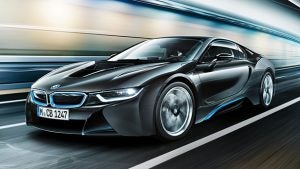 The BMW i8
The BMW i8
In terms of colour, there’s no information in the ether as yet – but we can take a guess. While Apple products of sported a host of paintjobs in the past, it has recently tended towards a select few hues. We’re talking about black, white, champagne, rose gold, silver, and space grey – core colours for contemporary Apple fare, and all in with a chance of being splashed across the chassis of an Apple Car.
Jean Louis-Gassee, a former Apple executive writing for the Monday Note, explains that Apple may just offer a single colour option.
“Just as Apple managed to get much higher iPod margins than competing makers, can the Cupertino company do better than Toyota or Ford?” he writes. “One way Apple could simplify the path to profits would be to offer a single model in a single colour (rose gold maybe; white, more likely).”
On January 5, 2016, an Argentinian designer Matias Papalini has revealed his vision for the Apple Car interior. The images show what look to be a detachable steering wheel with a large – and probably touch-sensitive – display running the length of the dashboard.
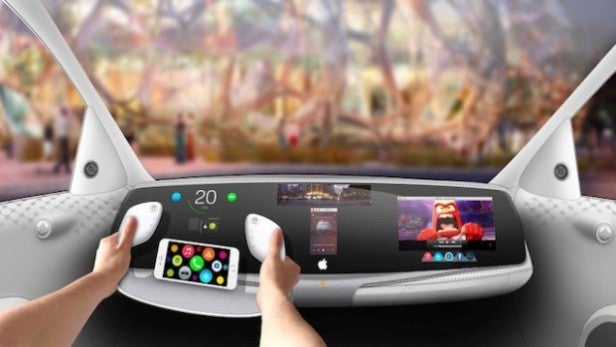
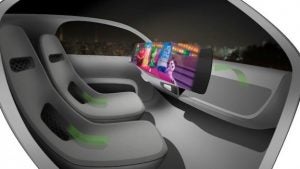
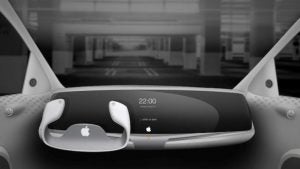
With Apple playing its cards close to its chest however, we’ll be in the dark about the Apple Car design for quite some time.
Related: What is Google X? See what’s cooking in Google’s secret lab
Apple Car technology – Is the Apple Car driverless or electric?
Two of the most commonly asked questions about the Apple Car are whether it will be (1) electric, and (2) driverless. Let’s tackle these one at a time.
For the former, we’d have to say yes, the Apple Car – should it exist – will almost certainly be electric. For a start, the majority of Apple’s auto-industry hires have at least some experience with electric vehicles. That’s evident from the aggressive acquisition of Tesla staff, a company that’s built its name off the back of electric cars. It’s also clear that the industry is now tending towards electric cars; tech magnate Sir Richard Branson has even predicted that there will be no “diesel or petrol internal combustion engines anywhere in the world” by 2020.
So if the future of cars is electric, and Apple is building a car for the future, it makes sense that the vehicle should be electric. And that’s not forgetting the persistent Apple Car leaks, all of which agree that the Apple Car will be electric. But the question of whether the Apple Car will be driverless is a little tougher to answer. While electric cars have certainly come to the fore, driverless vehicles still attract plenty of scepticism.
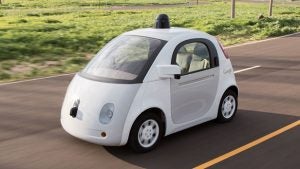 Google’s driverless car
Google’s driverless car
That’s because while autonomous vehicles might sound great on paper, putting cars on the road without an actual human behind the wheel is very difficult to roll out in practice.
“No one is going to want to realise autonomous driving into the world until there’s proof that it’s much safer, like a factor of 100 safer, than having a human drive,” said Andrew Moore, dean of computer science at Carnegie Mellon, speaking to The Atlantic.
Moore continued: “
Our best guess is that if Apple wants to hit its rumoured 2020 deadline, it will need to focus on electric cars initially.
To create a driverless vehicle will require a significant amount of development, and not just on the part of Apple; our governments still have to develop road infrastructure and legislation to the point where autonomous cars can be realistically used in public.
That said, there’s some evidence that Apple has been working on autonomous driving. Take, for instance, The Guardian report from 14 August that claims Apple is eyeing a testing ground for autonomous vehicles at a former naval base. Or The Guardian’s 18 September report that revealed Apple met with California’s DMV for discussions with driverless car experts.
So whether or not Apple is developing an autonomous Apple Car, it appears that the company has, at least, shown some interest in driverless technology.
Related: What is Google Project Wing and when will it take off?
Apple Car price – How much will the Apple Car cost?
Let’s say Apple is working on an electric vehicle – how much will it set you back? If previous Apple products are anything to go by, it’s likely that the Apple Car won’t come cheap.
Well according to technology analysts at Jefferies and Co, the Apple Car price will be set at $55,000. That’s an estimated price, which the analysts claim represents an average across several Apple Car variants, detailed in a 68-page report. That might sound expensive – the BMW i3 starts at $42,400 – but the Apple Car isn’t expected to go on sale for a long time, in a future market that will inevitably demand higher mark-ups.
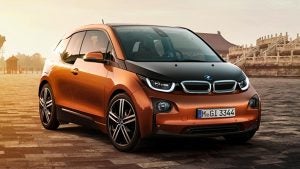 The BMW i3
The BMW i3
Jefferies and Co also predicted that Apple will sell at least 200,000 units of its very first vehicle. That’s a sizeable figure, especially as Tesla is expected to sell just 55,000 cars in 2015. Realistically, though, we have no idea how much the Apple Car will cost until Apple gets up on stage and reveals the figure to the world – if such a day ever comes.
Ford Interview – The Future of Autonomous Cars (Uncut):
What do you make of the Apple Car rumours? Let us know in the comments.


